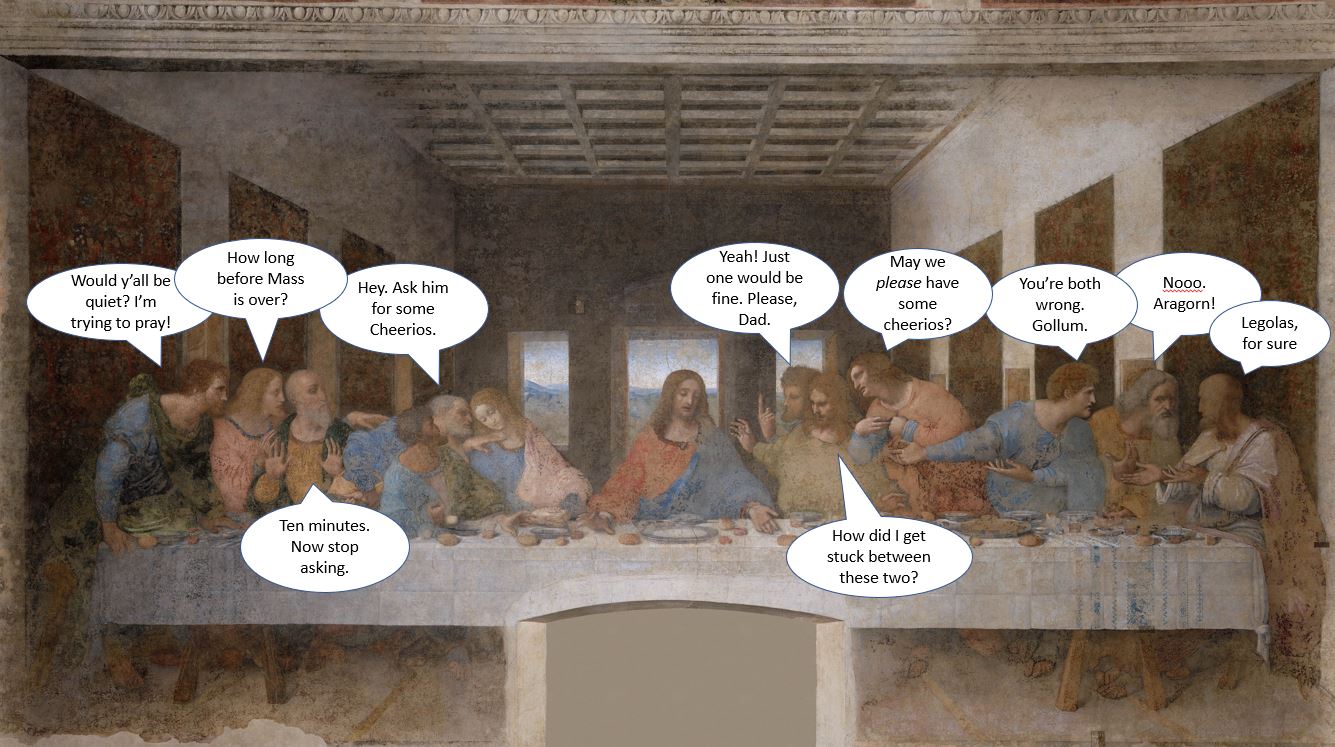Last time, I mentioned that we had upended our parenting scheme in favor of some (hopefully) more consistent. Rather than playing defense, we decided to press the offensive. Parenting, as I said directly, is a giant mess of trial and error. That’s OK. Nunc coepi.
Now it’s time to flesh out the details of the list I mentioned last time.
I understand rules are often difficult to follow (and remember). It helps if they rhyme, as Ray Guarendi says. “If you fight, you write. If you hit, you sit. If you whine, you do the time.” Stuff like that rolls off the tongue pretty well, but it doesn’t so much address the rules we have to hold for ourselves, which are often more complicated.
I know I can get trapped in the bunny hole of considering all possibilities of behavior and how I would address each one. That’s a recipe for disaster. Instead, I understand I have to be a better dad if I want my kids to follow me. That means clear expectations, toning down the shark music, and having a measured response when children go astray.
Here’s a refresher on what I mentioned last time
1. Mean what you say; say what you mean.
2. Have rewards, but use them sparingly and emphasize that work itself is a reward.
3. Divorce anger from the act of punishing. And in terms of punishing, make it immediate if at all possible. Do not let bad behavior slide. It will only get worse.
4. Minimize distraction. We don’t have a screen problem; we have an abundance of enjoyable distractions problem, and no clear place for these distractions to exist. Inevitably, they would work their way into the homeschooling area. Then no one gets any work done.
5. More time for play (I promise this doesn’t conflict with #4, and I’ll explain why)
6. Have a reliable schedule
7. Emphasize family unity (no one’s done until everyone’s done; your sins impact others; if one of us is going, we’re all going)
8. Don’t be afraid to take away big privileges and incur some inconvenience for yourself: your child’s eternal soul is worth it.
9. Checks and balances in homeschooling.
10. Speak a lot less.
11. Negative reinforcement is OK most of the time. Fear is a good catalyst when kids are young. They will learn how to do things out of love in time, but early on it’s about safety.
12. Make the house work for you, not you for the house.
Now taking them one at a time:
Mean what you say, and say what you mean.
I have twice linked to Catholic All Year‘s post entitled “Always Mean What You Say,” and this first rule is less revelation and more reminder. As a Dad and decidedly not speaking for my wife in this case, I tend to overstep the punishment in favor of a “shock-and-awe” sort of obedience. Some examples:
“If you don’t clean up your bowl, you won’t get ice cream for the rest of the month.”
The Problem: Kids don’t really understand time so much. We even have two calendars up where we eat with all of the family activities, feast days, appointments, etc. going on both this month and next, and even if I point and say, “You see! Today is the February 21st. You won’t get anything until March 21st,” they will likely just throw a little fit and, come dinner time, forget all about it.
What I have learned through many hundreds of mistakes is that the punishment needs to fit the crime not only for the sake of justice (and maybe even mercy), but for your own sake as a parent. Do I really want to enact the punishment I’m about to utter if my kid disobeys?
That’s not to say I shouldn’t incur some inconvenience at times to teach a valuable lesson to my child. One such example is when I kept my oldest daughter home from her beloved homeschooling co-op last Friday. It meant I was exposing myself to potential distraction (since I would also be working from home that day). In the end, I accepted that risk for the sake of my daughter understanding that we can’t behave in the way she did.
Even leaving a movie that you just paid tickets for and sat down to is fine. Leaving anything you paid for is fine. “Well I spent X dollars on this!” should never be an excuse for my child to run roughshod over the peace of the family.
In the end, everyone has different thresholds for what they’ll tolerate in terms of buying back inconvenience to stamp out disobedience, so I leave it to you. All I can say is that, for us, we are willing to take it on to protect the eternal souls of our children. That doesn’t mean I’m going to withold a meal or keep sweets away from them for a month (good luck – they’ll find a way, or they’ll forget, or you’ll forget, etc.).
Give Treats Sparingly; Work itself is a Reward
I recall a video from Dr. Ray Guarendi in which he talked about a child’s propensity for lying. When talking about appropriate punishment, he mentioned the gambler’s mentality which children often adopt when they discover mom and dad are inconsistent in meting out consequences.
Of course this extends beyond lying, but when a child learns there’s even the slightest chance they will get away with something with little to no blowback, they are more likely to keep doing that thing in the future. “I may get punished every once in a while,” they tell themselves, “but the payoff if I don’t is huge.”
I can see my children doing the same. How often I say the same things over and over! A premier example is requiring the children to ask before they do something (like feed the baby, stop working, grab a snack, etc.). My response was typically, “What are we supposed to do before X?” and I’d get a weak, “Asssskkkk,” in return. Then I’d let them have their treat.
The problem? They still didn’t ask! What I fool I can be. Now? Don’t ask = don’t get.
The good news is that the same mentality can be applied to having them do good things.
If I give treats for every good act, the treats becoming meaningless (i.e. they cease to be treats). Instead they become an expectation. This doesn’t bother me so much with potty training because no kid is going to rightly say, “Yea verily – if I do not receive my treat, I will wear diapers and soil myself 6 – 10 times a day!” No. They realize the underwear gig is pretty nice and want to keep it long-term.
But doing schoolwork? Chores? Just being kind to other members of the family? Yeah… I’d rather not be stuck in a loop of having to provide treats or praise every time something I like happens. Early on I might pour it on a little heavier, but there comes a point to dial it back. Keep the kids guessing. Our practical statement for the kids is this: “If you don’t do it, you definitely won’t receive a treat. If you do it, you might.”
Trying to get them to “gamble for the good,” we think, is a better long-term prospect for them to become good adults.
And of course, without being heavy handed, we remind them that often the work itself is a reward. After all, we were made for work. Our first parents were placed in the garden to tend to it, not lounge around eating grapes.
We don’t browbeat them about kids in foreign lands who can’t even write their names (not too often, at least), but we also make it clear the privilege it is to live in this great country and have the opportunities we have: to read unencumbered, go to Mass daily with very minimal threat of persecution or violence (it’s a shame I can no longer say no threat), stay home with mom, dad, and the siblings for school, frequent play dates and park days, special field trips, etc. We remind them that most kids get up at 6AM to get on a bus at 7:30AM and don’t get home until 4 or 5PM, then it’s homework and off to bed. Where’s the fun in that?
Instead – you get a couple concentrated hours of homeschooling and a couple extra hours of reading. The rest of the time is yours if you use it well. That’s a great reward. Learning is hard, knowing is fun.
Don’t Take it Personally: Divorce Anger from Punishment
Yeah, but you don’t understand. They really annoyed me. I’m sorry, Jonathon. You must be better.
This is what I often tell myself when I lose it. I also tell myself a number of other harsh realities in equally harsh tones:
- Your children will one day mirror your own behavior.
- Berate them now, and they will find someone else to console them later.
- You screw up all the time, why can’t they?
As an adult human male, it’s all-too-easy for me to slip into extermination mode: all problems must be solved – expeditiously and without regard for feelings.
But I have three little girls, and that doesn’t work. Even for my small sons, it’s still not appropriate. They don’t understand when dad gets worked up over using his nice claw hammer to dig holes in the yard. It’s the perfect tool for the job, Dad!
Which is why I have to come back to that same question I’ve tried to ask myself for a few weeks now: Is it an offense against God, or does it just annoy me?
Most of the time, it just annoys me. When it is just an annoyance, how do I convey that to my children? Through fits and screams? Well I can only imagine how they’ll respond when faced with similarly annoyances. Also, the clawhammer can be replaced. My relationship with my child cannot. Hard truths matter to us Dads. They stick a little bit better in the brain.
I’ve got very little time to teach my boys how to act like men, and teach my girls how to desire good men. Why waste time or undo good work by modeling a bad man? Take the anger out of it, Dad. I heard from a good friend that Napoleon would require individuals with complaints to write him a letter. Once in receipt of this letter, he would stuff it in his drawer and not look at it again for several weeks.
He found most of these problems went away naturally. Either the individual eventually overcame their frustration after writing the letter, or the two (or more) parties would reconcile. How does this look for me, as a father?
If you have a complaint, write me a letter (I have yet to receive one).
If I feel my insides roiling, step out for a few minutes.
If I can’t step out, for one reason or another, keep my darn mouth shut. I don’t need to be dramatic. My face should betray no inner frustration. What good would it really do?
The above rely on something which we will be working on until the day we die: self-mastery.
Your children may require forceful punishments at times. Direct disobedience. Endangering themselves or others through negligence. The alternative is so severe that it warrants a quick and sometimes painful response.
Most of the time, however, our children suffer the blunt force trauma of our own shortcomings. That’s on me to work out. Leave them out of it.
Minimize Distraction. Maximize Happiness.
I sometimes wish I had never been exposed to the Little House books. They paint an appealing picture of the height of simple living. Of course it was also a great deal of work, but then it sure seems like folks of ages past had their priorities finely crystallized. These days it’s hard to say.
How do we cultivate a Little House mentality in the modern age? Or, how do I, as a father, consider the example of Mr. Do-and-Disappear himself? Saint Joseph, Patron of Fathers and the Universal Church, is striking his fatherly strength and childlike obedience. There was nothing superfluous. At least I feel confident making that assumption since he had to up-and-move on multiple occasions with almost no notice. A person tethered to material things would have hemmed and hawed over which hiking boots to wear while Herod’s soldiers banged down the door.
I have to ask myself: how quickly could I move? A week? A day? Could I move in hours?
Does it mean having very little? No, not really. It means needing very little. This is where contemplating death helps. We can’t take it with us after we die, so what good is caring about it so much while we’re here outside of the need for us to show respect for the gifts we have been given (or the gifts others allow us to use)?
To practice this detachment, we have tried to refocus our priorities in the household much like our ancestors must have. Gone (well, stuffed in a closet) are the buckets of toys. The kids have really not missed them.
In their place, the children have access to a large amount of crafting items. All disposable. If a cap is left off a marker and it dries out, oh well. Take better care of your things, but don’t worry about them going bad. There’s plenty of paper, envelopes, felt, glue, modpodge, cardboard, etc. for them to construct their own home. They have the opportunity to create for the good of the family rather than consume for the good of themselves.
We have also redoubled our efforts to stock our shelves with books worth reading. To that end, we have a few book lists we really like:
- A Mother’s List of Books (Theresa Fagan)
- We have both the 2009 and most recent 2021 version
- We have both the 2009 and most recent 2021 version
- Robinson Curriculum Booklist
- Good Books for Catholic Kids
- Western Academy Summer Reading List
- Magnolia School Summer Reading List
And our budget for books is effectively infinite (or simply constrained by our need to eat and pay the bills). We have seen the fruits of stuffing our home to the gills with books: our children love to read. Not all at the same level, and certainly preferences diverge among our children, but they are generally content to spend at least a couple hours with their noses in books every day. We also almost never buy books used, which helps keep the cost down and the desire to “keep” or “protect” the book in check. No need to get attached to things. It’s only money; books can be replaced. Read them. Love them. Pass them on.
If you’re looking for a good place to buy used books, try Bookfinder. We’ve been using it for years.
The point is, we asked ourselves the following question: What do we want our family to prioritize? The answers were, in order, God, each other, and developing virtue. For us, we had a our time envisioning virtues being developed with the plethora of distractions at our fingertips. Paring back has allowed our children to spend more time outside, crafting, or reading, and we’ve seen a big difference in their demeanors and cooperation. It’s not perfect, and there is still plenty of consternation, but we are gradually working out the kinks.
Next Time…
…we’ll see how many rules we can get through. I am fairly long-winded.






